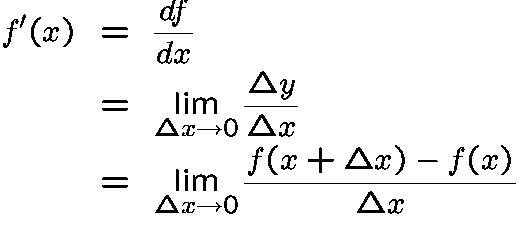
The derivative of a function y = f(x) is defined as:

For a linear function y = f(x) = bx + c, the derivative is equal to the slope b. Proof:

For a quadratic function,

the derivative equals 2ax + b. Proof left as an exercise.

That is, although the argument of f is another function g(x), we treat g(x) as if it were just a regular variable and differentiate f using ordinary differentiation with respect to that variable. We then multiply by the derivative of g with respect to x, or in other words g'(x), to get the complete derivative.

The gradient is defined as the vector of partial derivatives of the function with respect to each variable; i.e. for each variable, we take the derivative of the function with respect to that one variable while treating all the others as constants.